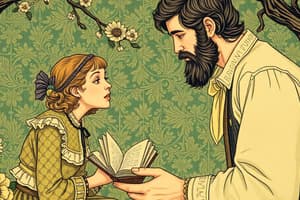Podcast
Questions and Answers
How does Steinbeck illustrate Lennie's vulnerability in Of Mice and Men?
How does Steinbeck illustrate Lennie's vulnerability in Of Mice and Men?
- By emphasizing his intelligence in social situations.
- By showcasing his immense physical power.
- By depicting his dependence on George. (correct)
- Through his ability to fend for himself.
What literary device does Steinbeck use to compare Lennie's behavior to a dog?
What literary device does Steinbeck use to compare Lennie's behavior to a dog?
- Allusion
- Personification
- Simile (correct)
- Metaphor
What theme does Lennie's character primarily reflect in relation to society?
What theme does Lennie's character primarily reflect in relation to society?
- The celebration of social independence.
- The harsh realities faced by marginalized individuals. (correct)
- The idealization of strength and power.
- The importance of individualism.
Which of the following best represents Lennie's childlike nature?
Which of the following best represents Lennie's childlike nature?
What imagery does Steinbeck use to convey Lennie's physical power?
What imagery does Steinbeck use to convey Lennie's physical power?
What does Lennie's behavior suggest about the societal expectations during the Great Depression?
What does Lennie's behavior suggest about the societal expectations during the Great Depression?
Which aspect of Lennie's character creates inevitable tension in the narrative?
Which aspect of Lennie's character creates inevitable tension in the narrative?
How does Lennie's character reflect the theme of loneliness?
How does Lennie's character reflect the theme of loneliness?
What is the significance of Lennie's strength in the narrative?
What is the significance of Lennie's strength in the narrative?
How does Lennie’s relationship with George contrast with the lives of other itinerant workers?
How does Lennie’s relationship with George contrast with the lives of other itinerant workers?
What does Lennie's repeated request to George about rabbits symbolize?
What does Lennie's repeated request to George about rabbits symbolize?
What does Curley’s reaction to Lennie’s innocent laughter illustrate?
What does Curley’s reaction to Lennie’s innocent laughter illustrate?
Which theme is emphasized through Lennie's character as portrayed by Steinbeck?
Which theme is emphasized through Lennie's character as portrayed by Steinbeck?
What does Lennie’s inability to understand social norms foreshadow?
What does Lennie’s inability to understand social norms foreshadow?
What dual nature does Steinbeck attribute to Lennie’s character?
What dual nature does Steinbeck attribute to Lennie’s character?
How does Lennie’s character critique the treatment of marginalized individuals?
How does Lennie’s character critique the treatment of marginalized individuals?
What role does the dream of owning land play in Lennie and George's relationship?
What role does the dream of owning land play in Lennie and George's relationship?
What does Lennie's tragic flaw reveal about societal values during the Great Depression?
What does Lennie's tragic flaw reveal about societal values during the Great Depression?
Flashcards
Lennie's Vulnerability
Lennie's Vulnerability
Lennie's childlike innocence and dependency on George make him vulnerable in a harsh world where people must fend for themselves. His inability to understand social complexities is reinforced by comparisons to a terrier needing guidance and his imitation of George's movements.
Lennie's Strength vs. Innocence
Lennie's Strength vs. Innocence
Lennie's immense physical strength, described as "bear-like," presents a contrast to his childlike innocence. This creates an inherent danger and tension, suggesting his strength is uncontrollable and could lead to unintended consequences.
Lennie's Bear-like Presence
Lennie's Bear-like Presence
Steinbeck uses Lennie's physical presence, described as "dragging his feet like a bear," to highlight his strength and lack of refinement. This imagery suggests Lennie's powerful yet clumsy nature, foreshadowing potential harm.
Lennie's Uncontrollable Strength
Lennie's Uncontrollable Strength
Signup and view all the flashcards
Lennie and Loneliness
Lennie and Loneliness
Signup and view all the flashcards
Lennie and Marginalization
Lennie and Marginalization
Signup and view all the flashcards
Lennie as Symbol of Connection and Conflict
Lennie as Symbol of Connection and Conflict
Signup and view all the flashcards
Lennie's Strength: Asset and Liability
Lennie's Strength: Asset and Liability
Signup and view all the flashcards
Lennie & George: Bond of Companionship
Lennie & George: Bond of Companionship
Signup and view all the flashcards
Dream Farm: A Symbol of Hope
Dream Farm: A Symbol of Hope
Signup and view all the flashcards
Lennie: Innocent Yet Vulnerable
Lennie: Innocent Yet Vulnerable
Signup and view all the flashcards
Lennie & Marginalized Groups: A Parallel
Lennie & Marginalized Groups: A Parallel
Signup and view all the flashcards
Lennie & George: A Shared Fate
Lennie & George: A Shared Fate
Signup and view all the flashcards
Lennie: Symbol of Innocence & Strength
Lennie: Symbol of Innocence & Strength
Signup and view all the flashcards
Steinbeck's Critique of Marginalization
Steinbeck's Critique of Marginalization
Signup and view all the flashcards
Lennie's Strength: A Double-Edged Sword
Lennie's Strength: A Double-Edged Sword
Signup and view all the flashcards
Lennie & George: A Bond Against Isolation
Lennie & George: A Bond Against Isolation
Signup and view all the flashcards
Study Notes
Lennie's Characterization in Of Mice and Men (Part 1)
- Lennie is presented as a physically powerful but innocent and childlike character, contrasting with the harsh realities of 1930s America.
- Lennie's vulnerability stems from his dependence on George, mirroring his "childlike" nature, as seen in his imitation of George's movements.
- Lennie's inability to control his immense strength foreshadows tragic consequences.
- Lennie’s strength, though a potential asset, is ultimately his weakness; he cannot control the unintentional harm he causes, like when he accidentally kills a mouse.
- This contrasts with the importance of physical labor during the Great Depression, showcasing a societal disconnect.
- Lennie's innocent nature is both charming and perilous.
Lennie and George's Relationship
- Lennie's relationship with George highlights his emotional dependency; this is shown by Lennie's repeated requests for stories about rabbits, symbolizing their shared dream of owning a farm.
- This dream embodies a sense of stability and hope amidst their harsh realities.
- The uncommon friendship between Lennie and George challenges the isolation frequently experienced by itinerant workers, particularly during the Great Depression.
Lennie and Societal Expectations
- Lennie's struggle to navigate social expectations and his lack of understanding of social cues are highlighted through interactions.
- Curley's immediate hostility towards Lennie illustrates a form of prejudice and misjudgment.
- Lennie’s inability to understand that his actions have consequences creates tension and sets the scene for future tragedies, foreshadowing his inevitable downfall.
- Lennie's character reflects the challenges faced by marginalized individuals in the 1930s, who were often ostracized.
Foreshadowing and Tragic Irony in Lennie's Actions
- Lennie’s innocence and lack of social understanding foreshadow tragic events.
- His inability to understand societal norms and the consequences of his actions puts him in peril.
- The contrast between Lennie's potential strength and his inability to control it creates a tragic irony, foreshadowing his eventual downfall.
- Lennie represents the vulnerability of those not conforming to social norms.
Studying That Suits You
Use AI to generate personalized quizzes and flashcards to suit your learning preferences.




